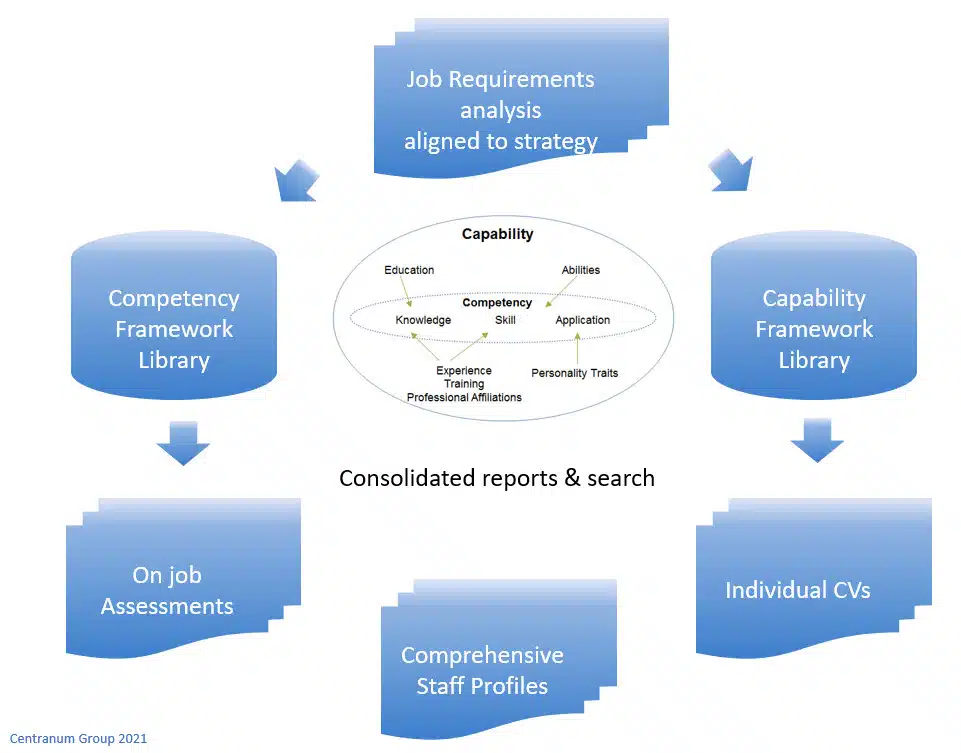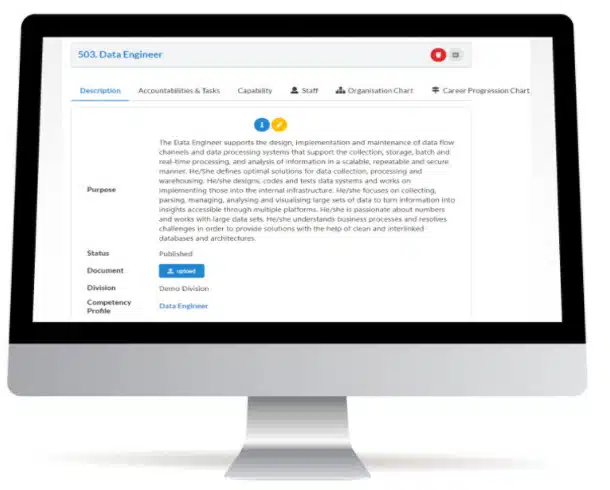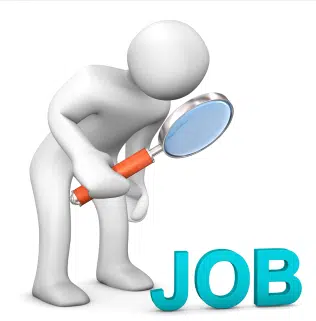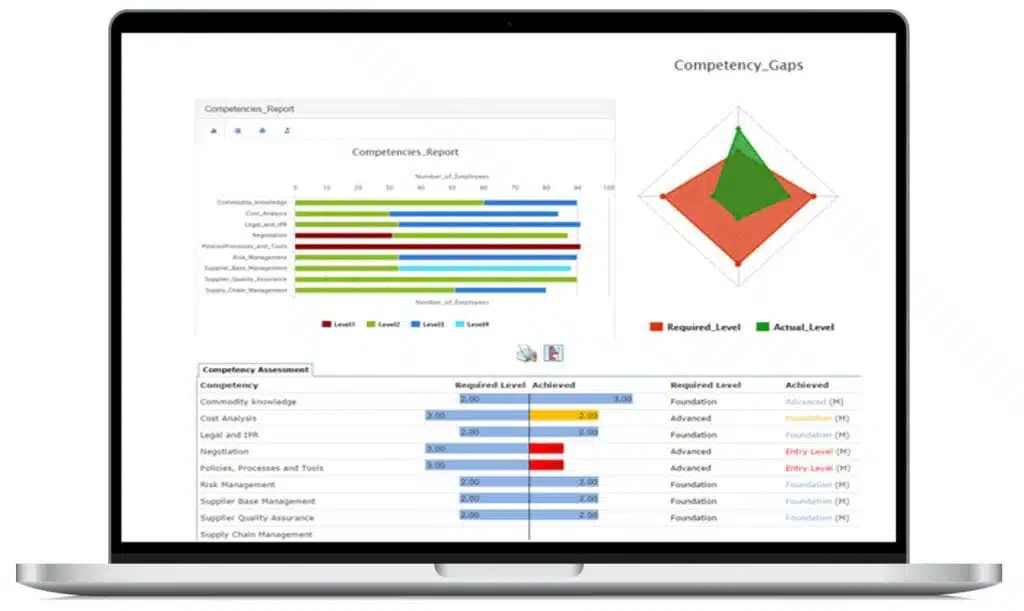Capability & Competency
A real time view
across the organization
Why capability matters for performance, assurance, and growth
Organizational capability describes the collective capacity of a workforce to deliver on strategy.
It connects role requirements, qualifications, and experience with measurable performance outcomes — showing whether the organization truly has the skills and knowledge to achieve its goals.
Managing capability means understanding not just what individuals can do, but whether the organization as a whole can perform consistently and safely across every function.
Centralise Capability & Competency Data
A single integrated source of truth combines:
Most organizations hold capability information in many places — HR records, learning systems, spreadsheets, and personal files.
Without consolidation, it’s impossible to see where strengths or gaps lie.
- A centralized capability and competency repository allows you to:
- Define consistent capability standards across roles and job families
- Link qualifications, training, and experience to each role requirement
- Track competency assessments against those standards
- Identify systemic skill shortages early
When capability data is unified, leaders gain a single source of truth for planning, assurance, and workforce reporting.
Centranum Definition
Capability – the verified capacity to perform a role, based on qualifications, experience, and demonstrated competence.
Competency – the applied knowledge and behaviors that prove capability in context.
Capability Passport – the integrated record of an individual’s capability, including formal achievements, certifications, and competency evidence.


Ensure Strategic Alignment
of Capability & Competency frameworks
Capability frameworks translate business strategy into workforce requirements.
They answer the question: What must our people be capable of to achieve our objectives?
Aligning capability with strategy helps organizations:
- Prioritize learning and recruitment to support future demand
- Allocate the right expertise to projects or operational units
- Demonstrate compliance and readiness for audits or accreditations
- Reduce duplication of effort across regions or business lines
When capability frameworks are actively managed, strategy and workforce development stay connected — not separated by spreadsheets and assumptions.
Understand Job Capability Requirements
Capabilities & Competencies needed for success
Every role carries specific expectations — knowledge, experience, and certifications that define readiness to perform.
Documenting these capability requirements at the role level is the foundation of good job design and competency mapping.
Effective role definitions should specify:
-
Technical capability: required licences, systems knowledge, or methods
-
Professional capability: decision-making scope, analytical skill, problem-solving depth
-
Behavioral capability: communication, teamwork, adaptability
Within Centranum, competencies are managed as part of capability — the observable behaviors and skills that demonstrate whether capability requirements have been achieved and maintained.
When individuals meet both the formal requirements and the applied competencies for their role, this complete evidence forms their Capability Passport.


Measure and Track Capability and Competence against requirements
Compare requirements to actual
- Capability describes what should be in place — qualifications, experience, and role requirements.
Competency confirms how effectively those capabilities are being applied.
Both must be measured together to understand real workforce readiness.A structured measurement approach allows you to:Verify formal capability attainment (licences, training, experience)Assess competencies as proof that those capabilities are used effectivelyCombine all evidence into each person’s Capability Passport, providing a current, validated record of what they can do and how well they perform
Track growth, renewal dates, and new achievements over time
In Centranum: The Capability Passport provides a complete, auditable view of workforce capability — bringing together verified achievements and competency assessments in one place.
A real time window into Capability and Competence across the organization
By organisational unit, time periods, capability or competency
When each individual’s Capability Passport is maintained, leaders can see at a glance:
- The current capability status of every team and function
- Verified qualifications, certifications, and training completions
- Recent competency assessments and performance indicators
- Emerging gaps or expiring credentials
This unified data gives a real-time, evidence-based view of organizational capability — not assumed readiness, but proven achievement.

Why It Matters
Recognizing competencies as the demonstrated element within capability makes workforce data complete and actionable.
Centralizing all evidence — formal qualifications and assessed performance — in one Capability Passport provides:
- Traceable assurance for audits and regulators
- Clear accountability for maintaining capability
- Accurate analytics for development and succession planning
Understanding organizational capability means knowing both what your people have achieved and how effectively they apply it.
FAQs
What is organizational capability?
Organizational capability is the collective capacity of a workforce to deliver on strategy.
It combines role requirements, qualifications, experience, and assessed competencies into a single view of what the organization can do and how effectively it performs.
Measuring capability provides real evidence of readiness, not just assumptions based on headcount or training records.
How are competencies related to capability?
Competencies are the applied, behavioral expression of capability.
They show how individuals use their knowledge and experience to achieve outcomes.
In Centranum, competencies are included in each role’s capability profile and form part of every person’s Capability Passport — the verified record that combines achievements with demonstrated performance.
What is a Capability Passport?
A Capability Passport is an integrated, evidence-based record of an individual’s capability.
It brings together verified qualifications, training, experience, professional credentials, and assessed competencies in one place.
Organizations use Capability Passports to maintain current, auditable proof of workforce readiness for assurance, compliance, and development planning.
Why is capability management important?
Managing capability ensures that strategic goals are achievable with the workforce you have — and identifies where investment is needed.
It supports compliance, improves role clarity, and aligns training with operational risk.
Without structured capability management, organizations rely on assumption rather than evidence to make critical workforce decisions.
How is capability measured?
Capability is measured through verified evidence: qualifications, training records, professional certifications, and demonstrated competencies.
Assessments confirm whether individuals meet defined role requirements.
When combined into a Capability Passport, these data points provide an accurate, real-time view of workforce readiness and assurance.
